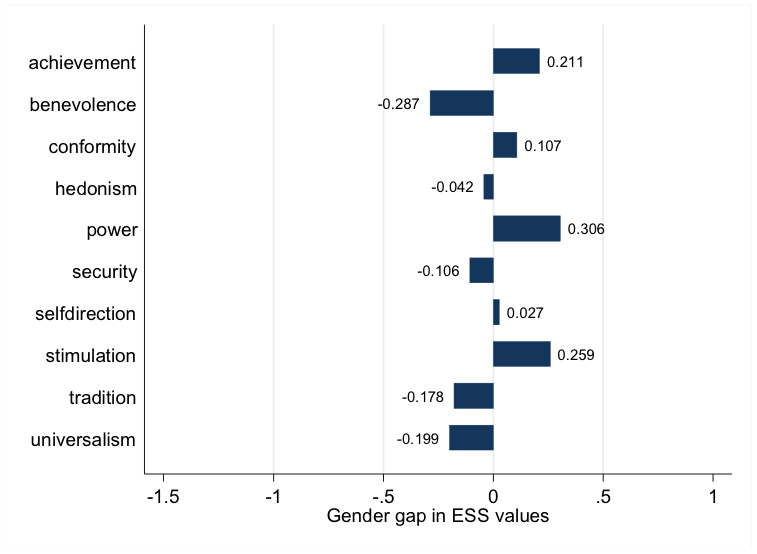Art and Culture
The Google Diversity Memo: It’s still stereotyping—just not the way you think it is!
What Google needs to do is to tailor its diversity policies towards the men and women who work at Google.

As academics who have collectively done a lot of research on gender, we have been following the discussion about James Damore’s memo about diversity at Google and the subsequent arguments for and against with a lot of interest. First of all, we have to applaud James Damore for actually reading some of the science on this topic. Second, like Scott Alexander and other scientists who have spoken out on the topic, we agree with most of what he says about the science. A lot of data and many peer-reviewed articles show that women in the population are indeed more people-oriented than men. For example, the graph below taken from Adams (2016) shows gender gaps in values (defined as average male values minus average female values) in the European Social Survey (ESS). In this data, as well as in the World Value Survey, women are on average more benevolent and universalism-oriented, traits associated with being people-oriented, than men.

While some of the gender gaps might be small, we still have a very poor understanding how small differences in traits may translate into outcomes. Thus, although we don’t like these findings any more than other women (or men), we can’t argue with the basic findings that gender differences exist in the population.
However, Damore was still stereotyping, but not the way many people seem to think he was stereotyping. Saying that on average all women are people-oriented is not stereotyping if one is indeed talking about the population of women. The statement is based on hard facts, after all. Where Damore made a mistake was when he applied concepts that are valid for the population to the sample of women and men in tech and, more directly, the women and men working for Google.
According to some numbers, Google rejects 99.5% of applicants. This means the men and women who work at Google are highly selected. They chose to enter tech, they chose to apply to Google and Google chose them. These people are not the “typical” member of the population. As such, population averages are unlikely to describe their characteristics very well. Furthermore, since scientists have no data on the traits of men and women at Google (but we’d love to get it!), we have not studied them. Generalizing characteristics that may be relevant for the population to a highly selected subsample of the population without any data to back up the generalization is, in our minds, a classic example of stereotyping.

Is Damore’s mistake big? Potentially, yes. In research on selected samples that we have done together and with other co-authors, we have found that women and men in selected sub-samples are not “typical”. “Typical” gender differences can even reverse in selected subpopulations. We found, for example, that female directors in Sweden are much less “people-oriented” than women in the population in Sweden. Female CFAs are much less tradition-oriented than male CFAs, which is the opposite of the findings for men and women in the population. And female MBAs and directors in the finance industry are, if anything, less risk-averse than their male counterparts in finance, in contrast to the standard findings that women are more risk-averse than men.
The problem with Damore’s memo is that he argues Google should tailor diversity policies towards men and women in the population. This makes no sense. What Google needs to do is to tailor its diversity policies towards the men and women who work at Google. If, like female directors in Sweden, women at Google are less people-oriented than the “typical” woman in the population, does Google still need diversity policies? Presumably yes. It is always hard to be in the minority.
So Damore was stereotyping. But, what is not clear is whether the people who hated his memo understood in what way he was stereotyping. His mistake is a mistake many people make.
Should Google have fired him? Somewhat ironically, one of the reasons companies care about diversity is because diverse opinions can generate better decision-making. On the other hand, people who work at Google are not supposed to be the type of people who make the mistakes many people make.
Further Reading
Adams, Renée B. (2016) “Women on Boards: The Superheroes of Tomorrow?” Leadership Quarterly, 27 (3), 371-386
Adams, Renee B. and Barber, Brad M. and Odean, Terrance, Family, Values, and Women in Finance (September 1, 2016).
Adams, Renée B. and Ragunathan, Vanitha (2014) “Lehman Sisters”
Adams, Renée B. and Funk, Patricia C. (2012) “Beyond the Glass Ceiling: Does Gender Matter?” Management Science 58(2), 219–235.
Damore, J., 2017, “Google’s Ideological Echo Chamber: How Bias Clouds our Thinking about Diversity and Inclusion”, Unpublished memo.






